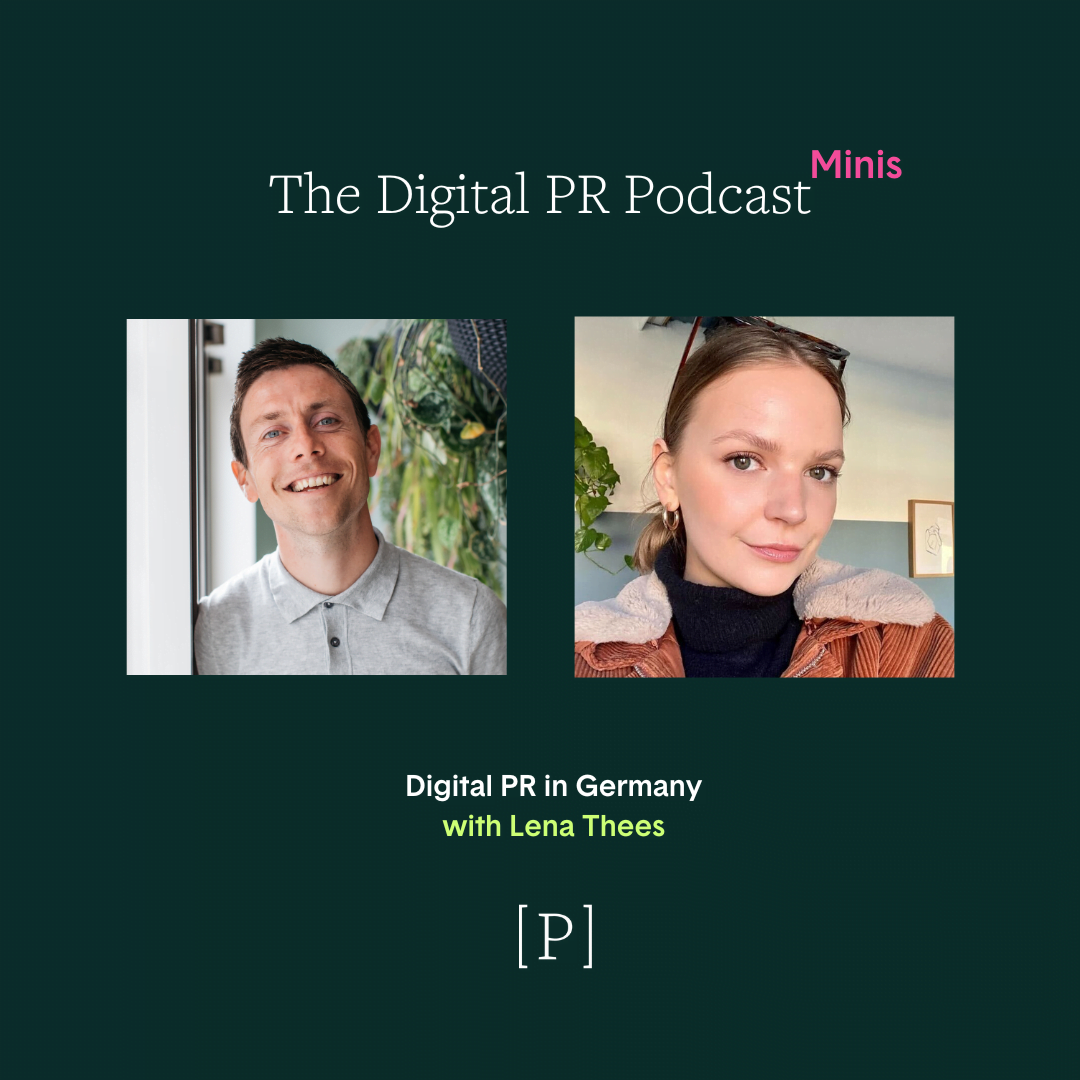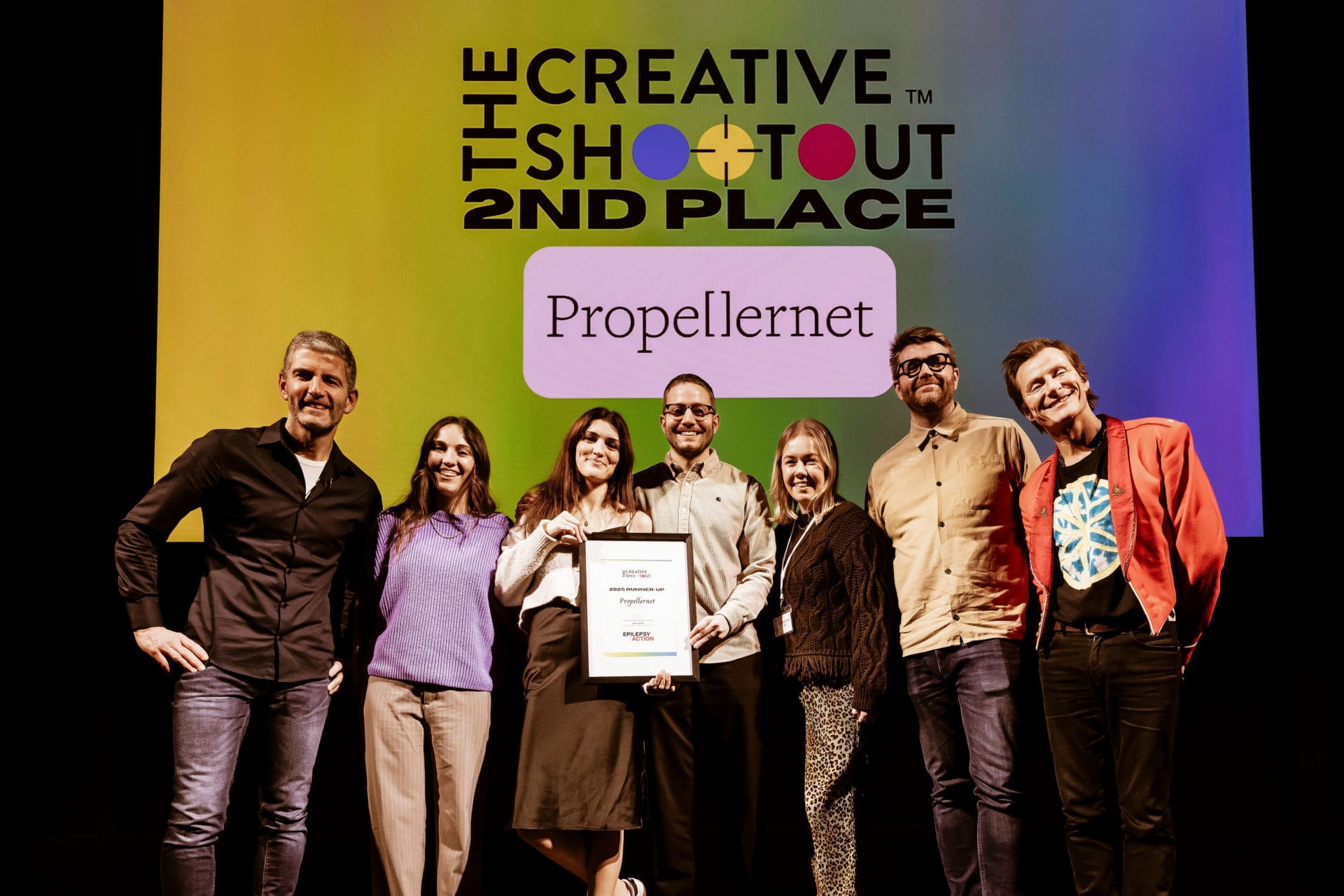
Most UK PRs know the UK media landscape like the back of their hand, and have a little black book (or email folder) filled with journalists who will cover their story. But what happens when you land an international client that’s looking to expand their reach to another region? This week, Steve is joined by Senior Digital PR Executive Lena Thees, our resident international team member. Hailing from Germany, where she studied marketing and communications, Lena has an in-depth knowledge of the German/DACH media landscape and has some great insights into international pitching and the German media landscape. Have a listen or you can read the summary of AI transcript below.
Go back to all episodes0:00:07 – Stephen Baker
Hello and welcome to the Digital PR Podcast. I’m Stephen Baker, and my co-host, Lou, is currently occupied with the very important task of raising a tiny human. But as they say, the show must go on. We’re currently in between seasons, but we wanted to treat you all with some mini episodes. Throughout June and July, we’ll dive into PR’s hottest topics and hear from the Propellernet PR team on everything from pitching to personality types. So grab a cup of tea, charge your headphones, and subscribe so you don’t miss any episodes. Today, I’m delighted to be joined by the wonderful Lena Thees, a senior digital PR executive at Propellernet. Thank you for joining us, Lena. How are you?
0:00:55 – Lena Thees
I’m good, thank you. It’s a pleasure to be here.
0:01:00 – Stephen Baker
I believe this is your first time on the podcast, which is exciting, especially since you’re from the beautiful city of Hamburg, Germany, and you specialise in the German market. Before we dive into that, could you tell us a bit about yourself and your career history?
0:01:24 – Lena Thees
Of course. As you mentioned, I grew up in Hamburg, which I highly recommend as a travel destination. I moved to the UK after finishing my A-levels, which was about eight years ago. Initially, I didn’t plan to stay long-term, but I loved it here so much that I never returned to Germany. I studied Media and Communication Management, which was my first exposure to public relations. During my degree, I sought work experience to enhance my CV and ended up interning at a London-based digital PR agency. That was my introduction to digital PR, and I found it really enjoyable.
We moved to Brighton a few years later, and when I sought a new challenge, Propellernet seemed like a natural fit. I’ve been with Propellernet for six months now, and I’m really enjoying it.
0:02:45 – Stephen Baker
I can’t believe it’s been six months already. It feels like you’ve been here much longer, which is always a good sign. We’re recording this in the height of summer, possibly the hottest day of the year so far. Brighton is the best place to be in summer.
0:03:12 – Lena Thees
Absolutely. I’m very excited for the next few months.
0:03:17 – Stephen Baker
You mentioned your internship and the path that led you to digital PR. What drew you to this field? Was there anything specific from your studies or experiences that guided you here?
0:03:59 – Lena Thees
Honestly, it was a bit accidental. Like many in this industry, I was looking for work experience and stumbled upon a digital PR internship. They were looking for a German speaker, and being from Germany, it seemed like a great fit. I didn’t know much about digital PR beforehand, but I enjoyed the internship a lot. The combination of using my English skills and my native German, along with my understanding of the German media landscape, made it very appealing. I was always drawn to media, which is why I studied Media and Communication Management. I even considered journalism for a while. Digital PR was a bit of an accident, but a happy one.
0:05:26 – Stephen Baker
That makes sense. I had a similar experience. I studied literature and film, always had an interest in media, and fell into PR almost by chance. It’s great how the variety in our backgrounds enriches our work. Now, one of your specialties is the German market. What are the main differences between the German and UK media landscapes?
0:06:54 – Lena Thees
One of the biggest differences is the formality. In Germany, communication with journalists is much more formal. We use last names instead of first names, and small talk is minimal. It’s about getting straight to the point and laying out the facts.
Additionally, lead times are longer. The posting frequency online is lower, making reactive stories harder to pitch. Journalists do a lot more of their own research, which takes time. Traditional media is also still very big in Germany, unlike in the UK.
0:08:15 – Stephen Baker
Is it due to fewer journalists or less pressure on them to post frequently?
0:08:29 – Lena Thees
It’s partly that traditional media is more prominent, and journalists are less reliant on PR pitches. They prefer to do their own research, which is time-consuming. Since I started in this industry, it’s always been this way.
0:09:12 – Stephen Baker
That makes sense. Your understanding of the German market has been invaluable. Has it influenced how you approach pitching to other European countries?
0:09:51 – Lena Thees
Absolutely. It’s shown me how individual each market is. There’s a huge advantage in having someone familiar with the local media landscape. Investing in translation and localization is crucial, especially if there are specific KPIs for each market. Germany and France, for example, are more similar to each other than to the UK. Understanding these differences is essential.
0:10:59 – Stephen Baker
Definitely. Every country is unique, and a bespoke approach is necessary. What does digital PR look like in Germany compared to the UK?
0:12:11 – Lena Thees
It’s quite different. Digital PR isn’t as established in Germany. Many journalists don’t fully understand our pitches or why we send them. There are fewer agencies offering digital PR as part of their SEO strategy, making it harder to get links. However, there’s a lot of untapped potential.
0:13:18 – Stephen Baker
Germany has many regional publications. How does your knowledge affect your pitching and outreach?
0:14:23 – Lena Thees
I make sure to get straight to the point in pitches. We use formal language, starting with last names, and avoid small talk. The pitch is concise, highlighting key results with bullet points and tables. Including the reason behind the research is important as well.
0:15:54 – Stephen Baker
Fascinating. What types of campaigns and themes perform best in Germany?
0:16:44 – Lena Thees
Data-heavy campaigns with solid methodology and credible sources work best. Business, education, tech, and relationship topics are popular. Avoid sports-related topics as they tend to be more challenging. Regional data and city comparisons also do well. Topical relevance is crucial, similar to the UK.
0:18:23 – Stephen Baker
Why do you think sports campaigns are more difficult in Germany?
0:19:08 – Lena Thees
Sports journalists are very focused on current events. They prioritise covering games and events, making it hard to interest them in other stories. Unless there’s a strong lifestyle angle, it’s challenging to get their attention.
0:20:35 – Stephen Baker
Interesting perspective. Finally, could you share your top three do’s and don’ts for securing coverage in Germany?
0:20:58 – Lena Thees
Of course. For do’s:
- Plan ahead: Lead times can be long, so start early.
- Be patient: Coverage can take time, sometimes weeks.
- Set appropriate goals: Understand that the German market is different and adjust KPIs accordingly.
For don’ts:
- Don’t engage in small talk: Get straight to the point in your pitches.
- Avoid clickbait: Sensationalist angles don’t work well and come across as tacky.
- Don’t spam journalists: Wait at least seven days before sending follow-ups to avoid being blocked.
0:23:33 – Stephen Baker
Those are excellent tips. Thank you so much for sharing your insights, Lena. It’s been a pleasure having you on the podcast.
0:24:16 – Lena Thees
Thank you so much.






